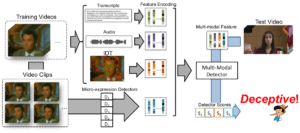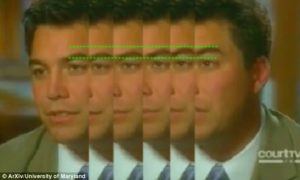DARE TO LIE?

Deception Analysis and Reasoning Engine (DARE) leverages Artificial Intelligence to detect deception in the courtroom. The researchers trained the Artificial Intelligence to detect five different micro-expressions. Five micro expressions related to lying are frowning, eyebrow raising, lip corners turning up, lips protruded and head side turn.
- In this post, I would like to analyze a disruptive lie detection technology for US court trials rather than a commercial company since I believe the system will eventually disrupt the way every single industry and company operates.
- Deception Analysis and Reasoning Engine (DARE) leverages Artificial Intelligence to detect deception in the courtroom. DARE is a lie detector as we used to see in superficial futuristic movies developed by researches from University of Maryland and Dartmouth College. The system classifies human micro-expressions. The basis of algorithms are coming from phycology. The researchers trained the Artificial Intelligence to detect five different micro-expressions. Five micro expressions related to lying are frowning, eyebrow raising, lip corners turning up, lips protruded and head side turn. Another source of data is vocal patterns. After watching 15 videos from courtrooms, DARE was tested to tell someone is lying in a video.
- Objective function is to optimize the probability of detecting lie a randomly chosen set of cases. Even in its primitive versions, DARE is better than humans in detecting lies. To be specific, DARE scores 0.877 while an average human scores 0. 58. In another metric, scientist claim that DAR can spot lie with 92% accuracy. The system will get better and better with more data. There are also other emerging technologies in lie detection such as eye detectors. AI can spot liars by chasing the movement of eyes. However, other technologies are not considered suitable for courtrooms. Truth serums are illegal or polygraphs aren’t taken seriously. DARE could be the only technology to make a real difference in the justice system.

- The skeptics and challenges of the technology is mostly around ethics. Lies in the courtroom is such a critical area that even the remaining 8% can make huge differences in people’s lives. According to Raja Chatilla, executive committee chair for the Global Initiative for Ethical Considerations in Artificial Intelligence and Autonomous Systems at the Institute of Electrical and Electronics Engineers (IEEE), DARE should be used with caution. “If this is going to be used for deciding […] the fate of humans, it should be considered within its limitations and in context, to help a human — the judge — to make a decision,” Chatilla told Futurism, pointing out that “high probability is not certainty” and not everyone behaves the same way. Plus, there’s a chance of bias based on the data used to train the AI. Regulations around those debates will play the critical role in determining the fate of the technology. Although some may argue that accuracy will hit 100% in a few years, I believe that the system will be always used with human intervention. The combination of human judgement and AI will significantly improve justice system.

- The applications are of course beyond the court room trial videos. It is even beyond just intelligence or crime interventions. Lie detection has potential to change the way society lives dramatically. A black mirror like world is getting real and closer. Imagine a world with google glasses that has lie detection application inside. Relationships between individuals, businesses will be radically transformed. Boyfriends cannot lie to girlfriends, students cannot lie about cheating on the exams, sales person cannot lie about product qualities. Expression detection has potential to go beyond lies. System can evolve to detect your mood from your cameras and offer you relevant movies or music. Interviews might be more challenging for MBA grads.
- Artificial Intelligence will be radically transforming the personal relationships and societal dynamics that can result in unimaginable negative results for the sake of greater good. What might be other interesting applications of micro-expression detection technologies? What is your opinion about the ethical challenges of those technologies?
Sources:
1.http://www.dailymail.co.uk/sciencetech/article-5197747/AI-detects-expressions-tell-people-lie-court.html
2. http://money.cnn.com/2017/10/04/technology/business/eyedetect-lies-polygraph/index.html
3.https://futurism.com/new-ai-detects-deception-bring-end-lying-know-it/
4.https://www.newscientist.com/article/mg21028182-900-the-truth-about-lie-detection/



